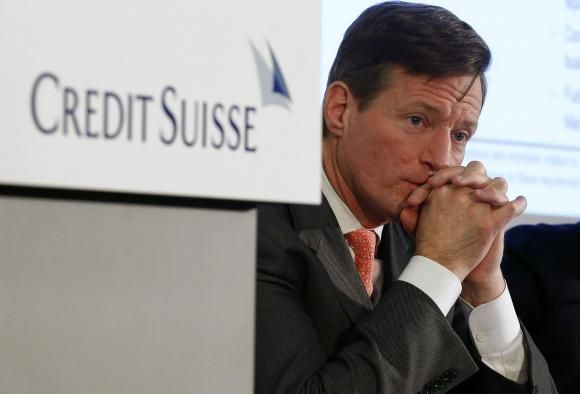Credit Suisse To Replace Long-Standing CEO Dougan: Sources

(Reuters) - Long-standing Credit Suisse boss Brady Dougan is set to quit as chief executive of the Swiss bank as soon as Tuesday and will be replaced by Prudential head Tidjane Thiam, people familiar with the moves told Reuters.
Thiam, a former Ivory Coast government minister who has led Prudential since 2009, will become one of the few top insurance executives to transition into banking when he takes charge of Zurich-based Credit Suisse, a global lender reeling from U.S. penalties and under increasing regulatory scrutiny.
Despite failing to overcome a shareholder rebellion when attempting to take over Asia-focused insurer AIA in 2010, French-speaking Thiam has brought value to investors by focusing on Asia as a key driver of profit.
"Tidjane will have a broader view," said Sally Yim, vice president at Moody's Investors Service.
"Credit Suisse has had different issues throughout the years and someone with a diverse background could look at its strategy with a fresh pair of eyes."
Prudential, Britain's largest insurer by market value, declined to comment. It reports its annual results at 0700 GMT. Credit Suisse declined to comment.
Prudential shares were suspended from trading in Hong Kong pending an announcement, the British insurer said in a filing on Tuesday. The stock has risen 200 percent in London under Thiam's watch, outperforming the 36 percent gain in the FTSE index.
"Credit Suisse needs a safe pair of hands to re-tool the business in an investor friendly way," said a Hong Kong-based investment banker who worked closely with Thiam. "That means they will re-focus more on Asia. May not be in investment banking, but in private banking and asset management."
Dougan is one of only three global bank CEOs still in his job following the global financial crisis, alongside JP Morgan's Jamie Dimon and Lloyd Blankfein at Goldman Sachs.
But he has faced pressure to quit since last year when Credit Suisse reached a $2.5 billion settlement with U.S. authorities for helping Americans evade taxes via secret bank accounts.
Although the Swiss bank's board backed the American chief executive over the deal, under which Credit Suisse pleaded guilty to criminal charges but held onto its New York license and its legally protected client data, he was criticized by some politicians and media in Switzerland.
LEGACY
Dougan, an Illinois native who has been at Credit Suisse for a quarter of a century and became CEO in 2007, has also been criticized for sticking with an investment banking strategy.
Cross-town Zurich rival UBS made a high-profile withdrawal from the business, regarded by many in Switzerland as too risky following the financial crisis.
Recent troubles aside, Dougan generally has been a well-regarded outsider in the Swiss banking community.
He won plaudits from investors for steering Switzerland's second-largest bank through the post-Lehman Brothers turmoil, cutting riskier trading activities and avoiding getting entangled in U.S. subprime mortgages to the same degree as UBS, which took a state bailout in 2008.
One of the best-paid bankers in the world with an annual salary topping 90 million Swiss francs ($91 million) five years ago, he recently saw a pay cut as part of cost-cutting measures taken by the bank to tackle the surge in the Swiss franc.
© Copyright IBTimes 2025. All rights reserved.





















